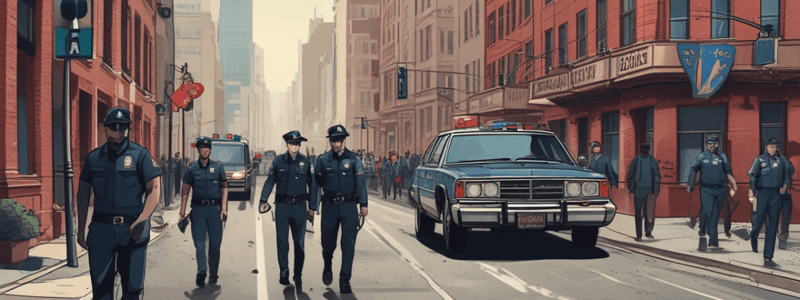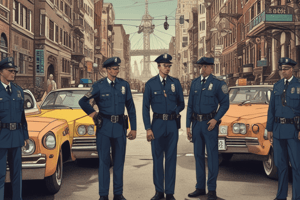Podcast
Questions and Answers
What is a potential consequence of extensive training plans for police agencies?
What is a potential consequence of extensive training plans for police agencies?
- They reduce operational costs significantly.
- They might lead to liability claims against non-trained agencies. (correct)
- They eliminate the need for community policing.
- They ensure complete protection from lawsuits.
Why could community policing potentially lead to civil liability?
Why could community policing potentially lead to civil liability?
- Closer ties may establish a special relationship, implying a duty to protect. (correct)
- Community policing eliminates the need for legal accountability.
- Improved community relations make officers exceed their authority.
- It primarily focuses on criminal prosecution without community engagement.
What issue was highlighted by the Arizona V. Evans case regarding technology usage by police?
What issue was highlighted by the Arizona V. Evans case regarding technology usage by police?
- Officers are expected to perform thorough audits of clerical work.
- The Exclusionary Rule always favors the police in cases of error.
- Clerical errors are not penalized under the law.
- Failure to use technology properly can result in new liabilities. (correct)
How has globalization impacted municipal police agencies?
How has globalization impacted municipal police agencies?
What guiding principle is suggested regarding innovation and liability in policing?
What guiding principle is suggested regarding innovation and liability in policing?
What major shift is occurring due to concerns about globalization and terrorism?
What major shift is occurring due to concerns about globalization and terrorism?
Which factor is crucial for police executives in the context of changes in law enforcement?
Which factor is crucial for police executives in the context of changes in law enforcement?
What is a consequence of the Failure to Protect in policing?
What is a consequence of the Failure to Protect in policing?
What is now considered the primary issue upon which liability hinges in law enforcement?
What is now considered the primary issue upon which liability hinges in law enforcement?
What is the impact of courts mandating training related to use of force in law enforcement?
What is the impact of courts mandating training related to use of force in law enforcement?
How has the perspective on police officers' education changed over time?
How has the perspective on police officers' education changed over time?
What has happened to the public duty doctrine in legal contexts?
What has happened to the public duty doctrine in legal contexts?
What trend is being observed regarding police behavior in light of court rulings?
What trend is being observed regarding police behavior in light of court rulings?
Why might police officers now face greater liability for their actions?
Why might police officers now face greater liability for their actions?
What change has been prompted by the Supreme Court regarding police training?
What change has been prompted by the Supreme Court regarding police training?
Which of the following aspects is NOT a reason for increasing liability of police departments?
Which of the following aspects is NOT a reason for increasing liability of police departments?
What significant legal assumption did the Civil Rights Attorney's Fees Award Act of 1976 create regarding police civil liability claims?
What significant legal assumption did the Civil Rights Attorney's Fees Award Act of 1976 create regarding police civil liability claims?
What shift occurred in the strategies used by attorneys when filing civil rights cases against police departments after the 1980s?
What shift occurred in the strategies used by attorneys when filing civil rights cases against police departments after the 1980s?
Which of the following factors became significant in determining police liability according to recent legal developments?
Which of the following factors became significant in determining police liability according to recent legal developments?
What did the Supreme Court's 1983 decision in Board of County Commissioner of Bryan County, Oklahoma V. Brown establish regarding the basis of a claim against police?
What did the Supreme Court's 1983 decision in Board of County Commissioner of Bryan County, Oklahoma V. Brown establish regarding the basis of a claim against police?
What challenge do claimants often face when filing police civil rights lawsuits?
What challenge do claimants often face when filing police civil rights lawsuits?
How has the lack of substantial law on governmental liability impacted police litigation?
How has the lack of substantial law on governmental liability impacted police litigation?
Which change in police liability litigation trends can be attributed to advancements in technology?
Which change in police liability litigation trends can be attributed to advancements in technology?
What is one potential risk associated with community policing models?
What is one potential risk associated with community policing models?
Flashcards are hidden until you start studying
Study Notes
Liability and Police Training
- Training and innovation in policing are crucial but can lead to liability claims for agencies with extensive plans versus those without.
- "Innovation equals litigation, but stagnation ensures liability" reflects the risk-reward dynamic in police operations.
Community Policing and Liability
- Closer community relationships through policing raise questions about special relationships and potential civil liability.
- Agencies risk liability under "Failure to Protect," presenting a dilemma between community relations and legal vulnerability.
Technology and Legal Implications
- The Arizona v. Evans case highlighted that clerical errors can lead to significant liabilities, even without officer misconduct.
- Courts emphasize the importance of properly utilizing technology, indicating increased scrutiny on law enforcement practices.
Globalization and the Shift in Policing
- Global threats and terrorism necessitate evolving police roles, now focused on areas considered a threat to emerging economies.
- Federalization of municipal police leads to enhanced security measures and a closer relationship with federal agencies in domestic affairs.
Trends in Liability and Law Enforcement
- Innovative police leaders are more likely to succeed, while liability concerns can inhibit effective law enforcement.
- Courts increasingly view public safety over law enforcement actions when determining liability in use of force cases.
Education and Training Mandates
- Courts now advocate for training in areas such as Use of Force and Pursuit Driving, impacting liability decisions significantly.
- A push for police education is evident, recognizing the need for knowledge beyond traditional training.
Judicial Trends on Liability
- The Public Duty Doctrine's effectiveness is declining, challenging the assumption that police owe no duty to specific individuals.
- Landmark cases like Tennessee v. Garner prompted policy changes around deadly force use and pursuit protocols.
Changing Legal Landscape
- Increased litigation from the 1960s to mid-1980s corresponds to legislative changes, particularly the Civil Rights Attorney's Fees Award Act of 1976.
- This Act facilitates civil rights claimants in acquiring legal representation, impacting the filing of civil liability claims against police.
Litigation Strategies
- Historical approaches to police liability focused on incident-specific claims, but now litigators emphasize department practices and histories.
- Cases are increasingly based on systemic patterns of behavior rather than isolated incidents, shifting the grounds for liability.
Summary of Judicial Assumptions
- Recent judicial trends indicate that assumptions about law enforcement behavior significantly influence liability determinations.
- Increased focus on police policies, training, and historical conduct illustrates the evolving landscape of civil liability in law enforcement.
Studying That Suits You
Use AI to generate personalized quizzes and flashcards to suit your learning preferences.




